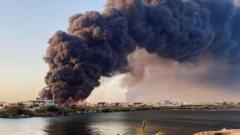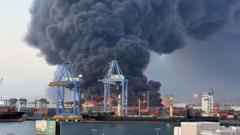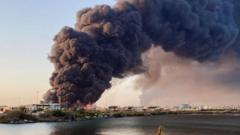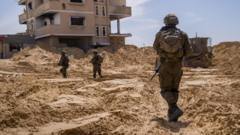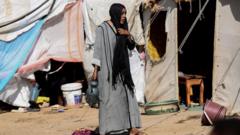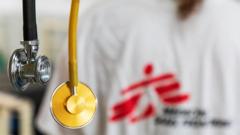The military's recent seizure of the presidential palace in Khartoum represents a pivotal moment in Sudan’s ongoing civil war against the Rapid Support Forces. While this victory boosts the army's morale and aims to restore power in the capital, fighting continues, and the humanitarian crisis deepens, leaving many to question what the future holds for the nation.
Sudan Army's Strategic Gain: Presidential Palace Recaptured Amid Ongoing Conflict
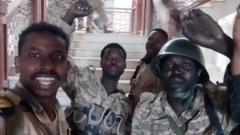
Sudan Army's Strategic Gain: Presidential Palace Recaptured Amid Ongoing Conflict
The Sudanese Armed Forces celebrate a significant triumph with the recapture of the presidential palace, but the war's future remains uncertain as the conflict drags on.
The scenes of elated soldiers in Khartoum underscore a crucial breakthrough for the Sudanese Armed Forces (SAF), marking significant progress in their battle that has intensified over two years. After initially losing control of the capital to the paramilitary Rapid Support Forces (RSF), the SAF's recapture of the presidential palace signals a changing tide. They are confident about regaining greater parts of Khartoum, yet challenges persist as the overall war remains ongoing.
The historic Republican Palace, now back under army control, serves as a powerful emblem for the military-led regime, which frames itself as a legitimate authority combating a “terrorist militia.” Following recent successes in clearing outer districts, the army has managed to reclaim significant territory in the city, specifically key government buildings and positions surrounding the military's General Headquarters.
However, the situation remains convoluted. Despite the loss of control in the capital for the RSF, remnants of their forces linger in central Khartoum and maintain a stronghold near the airport. The army anticipates persistent and bloody confrontations as they force remaining RSF units into retreat. Nonetheless, the paramilitary group has demonstrated resilience, exemplified by a drone strike on the palace that resulted in casualties among journalists and army personnel.
The capture of central Khartoum could potentially alter the war's trajectory, enabling the SAF to consolidate its power across a more unified Sudan. This could urge the army to mount strategic offensives against RSF territories, notably in the western region of Darfur, where General Mohamed Hamdan Dagalo (Hemedti) primarily operates.
Nonetheless, observers caution against the risk of effective partitioning of Sudan, with each faction and their respective allies increasingly entrenched in their territories. The RSF aims to assert its presence by establishing a parallel government in controlled areas, recently uniting various factions to draft a political charter, demonstrating its intent to retain influence despite battlefield adversities.
The humanitarian landscape continues to deteriorate, with the World Health Organization reporting approximately 12 million displaced individuals due to the civil unrest. The ongoing violence has imposed severe strains on basic supplies and caused widespread human rights violations. Khartoum, heavily looted, faces worsening famine conditions as the conflict disrupts aid efforts, compelling many citizens to rely on their survival instincts.
The fluctuating power dynamics in the capital might present an opportunity for improved humanitarian conditions, yet many doubt any immediate changes will benefit the average Sudanese. Both the SAF and RSF have faced accusations of hampering essential assistance, with the United Nations condemning the use of emergency aid as a war weapon. While mutual accusations of war crimes abound, the RSF often faces harsher scrutiny for its alleged actions.
As the SAF indicates ambitions for broader territorial claims following their tactical gains, uncertainties about either side achieving a comprehensive victory linger. The International Crisis Group has noted the improbability of any faction managing to govern all of Sudan, while both sides remain committed to sustained military conflict without tangible progress toward peace talks.





